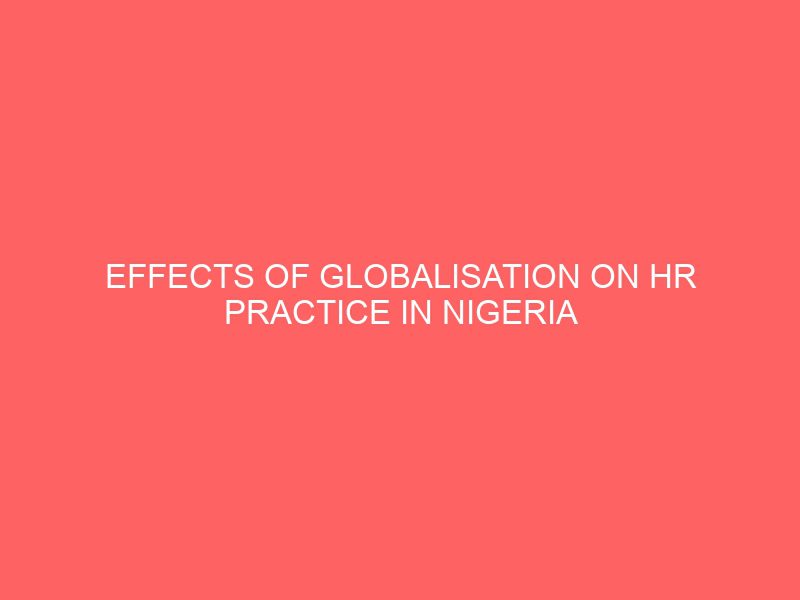Description
CHAPTER ONE
INTRODUCTION
1.1 Background to the Study
The question of globalisation is a question which cuts across centuries and even those it is one exacerbated by the advent of information technology especially the internet, it is a factor that has been around in respect to business and world development arguably up to the third millennium BC. It involved the close interaction of the world in terms of innovations, transportation, exchange of ideas and so on.
Globalisation has so far had bearings upon culture and religion and even the mode of governance. Every country now sees that it needs others even in the most seemingly unimportant of things like music and education. In terms of religion, the exchange of ideas has influenced religious believe so that even the most polarized of religions now try to exhume more of similarities than dissimilarities especially in the most popular of beliefs. In terms of business:
[g]lobalization is a term in business that refers to the integration of an organization’s operations, processes and strategies into diverse cultures, products, services and ideas. Because of its emphasis on diversity, globalization also has a deep impact on the way companies manage their employees(Jeremy Bradley)
This is the background to the present research we have set before ourselves here.
1.2 Statement of the Problem
Globalisation, while changing the world order in the aspects of military, education, communication, entertainment also bears upon the development of business. In this regard it expands the market of any product and services so that every business learns the workings of every market it aims at going into and carries out a campaign with informed themes on market. What this widening of markets for any business means is that employers have to bear in mind the factors of globalisation even up to the point of managing their employers. And if the research effort which has gone into this research is anything to go by, the effects of globalisation on Human Resources practices has not been studied before. This is the academic problem that has given birth to this research.
1.3 Research Questions
1.3.1 what are the direct and remote effects of globalisation on human resources management in Nigeria.
1.3.2 How has HR gained in these globalisation effects.
1.3.3 What are the previous Human Resources practices that Nigerian businesses have had to do away with as a result of globalisation factors
1.4 Objectives of the Study
The purpose of this research work on the effects of globalisation on human resources practices in Nigeria include:
· The identification of these said effects and how they have succeeded in opening up the Nigerian market to the rest of the world and posed the country as a favourable space for foreign investment.
· To describe the processes of these effects taking hold on the global and Nigerian local market.
· The research, if time factor does not affect the content, compare the traditional human resources with those of the globally influenced ones introduced.
1.5 Significance of the Study
The research is greatly important in the field of human resource development and management in the Nigerian market. It opens up the employees management myths which has so far reduced employees performance and customer relations. With the widening of business to needing a global outlook, such a research as the present one will show that the understanding of the effects of globalisation will better equip managers with the needed skills to poise their organizations into a better suited one for the wider, more challenging global market.
1.6 Research Hypothesis
The assumption on which this research work is build is that globalisation directly and indirectly affect the Human Resource management practices in Nigerian businesses.
1.7 Scope of the Study
In studying the effects of globalisation on the human resource management practises in businesses, the research will focus on how this bears upon the Nigerian businesses specifically. In terms if business, attention will be paid majorly on the private sectors since they are the ones most flexible in terms of global development and changes.
1.8 Limitations of the Study
The major limitations of this work is the time factor which in it’s lack constituted a distraction in doing an extensive research on the many kinds of businesses in Nigeria with peculiar demands in employee management.
1.9 Definition of Terms
Globalisation
refers to the transferring of goods and services, people, technological advancement, culture and information among countries of the world. It is the
“ action or procedure of international integration of countries arising from the convergence of world views , products, ideas, and other aspects of culture”(Wikipedia).







